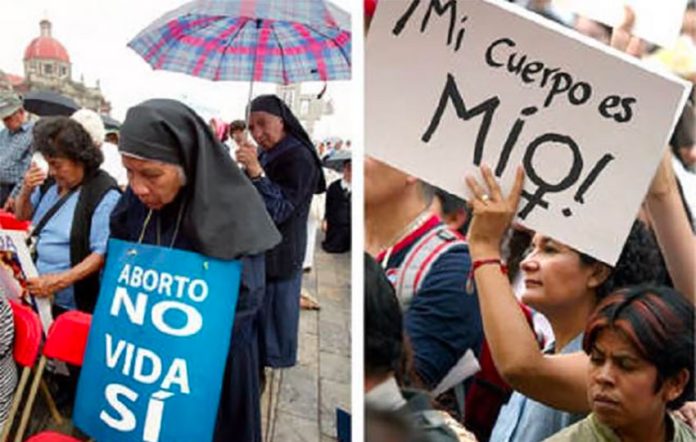Shortly after I first had my period (creepily, on Halloween the year I was 11), the hormonal changes I was going through caused me to put on a bit of weight, especially around the stomach.
I’d always been a skinny kid with no pudges, so as my fat distributed itself in larger quantities on my lower abdomen as it traveled around deciding on where to settle, I was extremely alarmed that, had someone said I was pregnant, (I thought) it would have been believable.
This panicked me. The actual chance of any kind of pregnancy wouldn’t come until many years later, and at this point in my life I hadn’t even held hands with a boy, let alone been within kissing distance of one.
But hadn’t the Virgin Mary become pregnant by God? What if that’s what this was? What if I really was pregnant by some terrible miracle? Would anyone believe that I hadn’t done anything? How would I deal with the humiliation? Actually caring for an infant was so unimaginable that I never even got to that point in my spiraling catastrophic thinking.
But pregnancy: no prospect seemed more horrific, and had one magically come about, I would have done anything in my power to make it go away.
This was on my mind last week when many pro-choice activists were disappointed to see that Mexico’s Supreme Court refused to set what many believed would be a significant precedent toward the country-wide legalization of abortion by striking down a restrictive law in Veracruz.
In Mexico City and now in Oaxaca, abortion before the 12th week of pregnancy is legal (though grotesque-looking protest signs in front of women’s clinics would have you believe otherwise, the overwhelming majority of abortions occur before the 12th week). Everywhere else, women can be arrested and jailed for having abortions, and in too many sad cases, for even being suspected of having had abortions. That’s right: there are currently women serving prison sentences for having miscarried, something I wrote about here and here.
I understand the basic argument of the pro-life movement: if the beginning of a potential for life as a full-fledged human is there, don’t snuff it out. I get it. Their point of view is understandable. I even get how some people might say, “Whatever horrible thing might have happened to the mother, this beginning of a life is a life, and it deserves a chance.” I can see that side of things, I just don’t agree that it’s the better argument.
I’ll say as well that it’s sometimes hard to take the sincerity of their concern for embryos and fetuses seriously when there’s so much slut-shaming and general demonizing that goes on as part of the argument for why a woman should be forced to go through with a pregnancy: “Well if you don’t want to get pregnant, keep your legs closed!” as if women could just sit around all day with their legs irresponsibly spread and catch pregnancy like a cold or the flu.
My memory’s failing me at the moment, but I think there’s something else that needs to happen for a pregnancy to appear, right? Something about another participant?
All sarcasm aside (I just can’t help it today, y’all — I’ve seen one too many “well maybe you should just quit being a slut” memes this week and I’m mad); surely there are areas in which we can all work together.
After all, being pro-choice doesn’t mean I hate babies or that I want women to get abortions so I can cackle evilly while I drum my fingers together, Mr. Burns-style. I’m constantly shocked at the fantastical tales that the anti-choice movement has come up with involving the lucrative sale of fetus parts. Really? You’ve got enough good arguments to get people to want to at least reduce abortions. Just stop there.
I don’t want women to get abortions; really, I don’t want them to get to the point of needing them. I don’t want women to have to deal with unwanted pregnancies in the first place. And guess what, folks? There are so many ways to deal with unwanted pregnancies by preventing them. Seems to me that that would be both our focus and the end of our argument.
Mexico does, in my opinion, a pretty good job at making birth control and sex education readily available. Various types are accessible through public health clinics, and they’re relatively cheap to buy privately as well. However, there are still significant gaps: educated women in urban areas have a much better chance of getting it than poor women in rural areas where health services (and for that matter, the opportunity for privacy when seeking them out) may be few and far between.
Local culture also plays quite a part. As a teenager in Texas, I received “abstinence only” education, which essentially means that rather than comprehensive sex education, students receive pamphlets with titles like “101 things to do on a date without having sex.” The expectation of purity — and the swift judgement for being “used goods” if you didn’t meet that expectation — was simply the sea we swam in.
You can imagine how easy it would have been to independently seek birth control in an environment like that, and I can’t imagine that it’s much different here, especially in conservative and traditional communities.
So let’s agree on this, yes? Working to get sexual health services to the most vulnerable in the country is something that I think both sides can get behind; it’s been proven over and over again to reduce unwanted pregnancies, and therefore a great number of abortions.
Y’all focus on that front. I’ll be over here trying not to catch an accidental pregnancy.
Sarah DeVries writes from her home in Xalapa, Veracruz.
